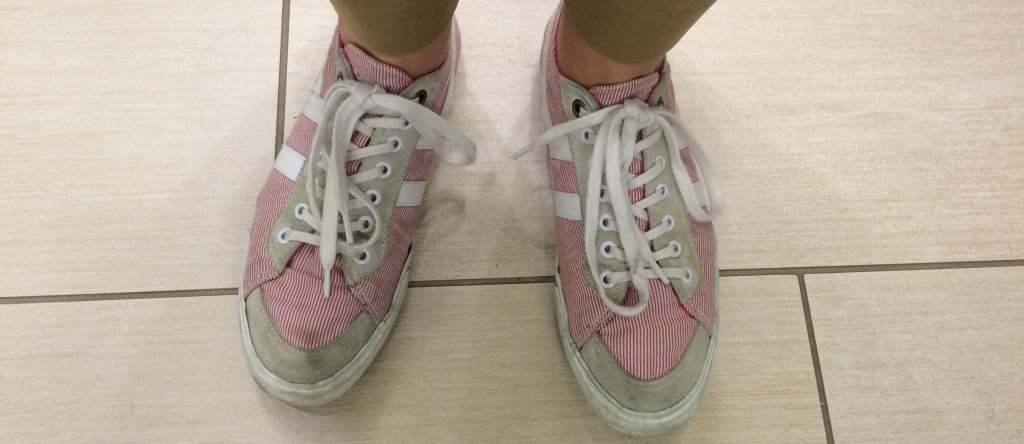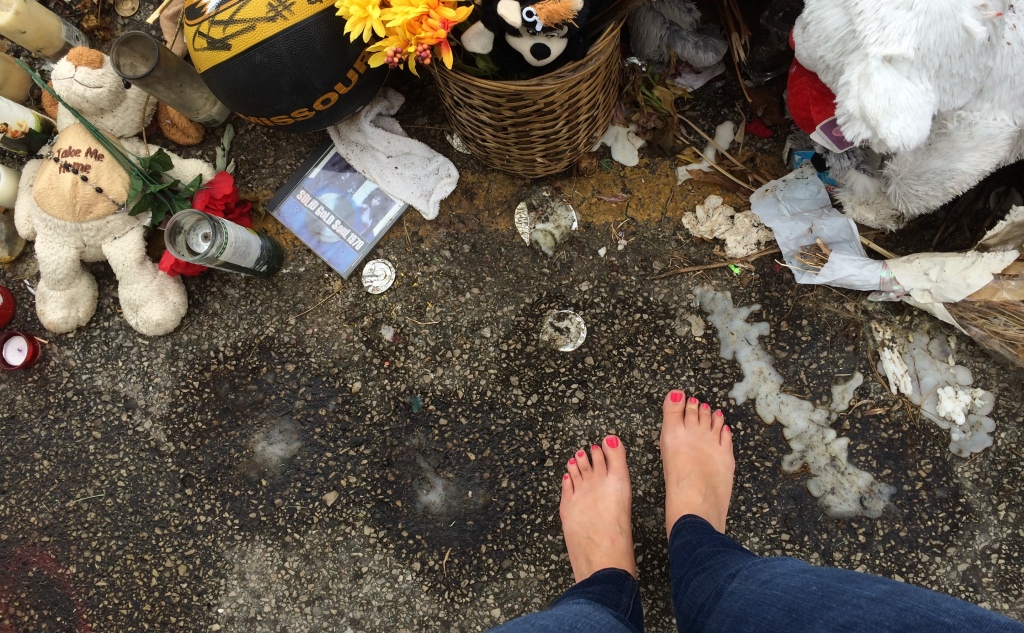“Don’t you think there is another side of the story,” was his opening line, as I pondered the stranger in front of me with puzzlement. My mind scrambled. What story? What other side?
“What do you mean?” I queried, studying the white collar, Caucasian man, a couple decades my elder.
“Well don’t you think there’s other people who have responsibility?”
“What people? And what responsibility?” I asked, trying my best to remain polite and engaged. Whatever code language it was that we were speaking was one that I either never learned or, more likely, had forgotten how to speak from years of disuse and disarming bluntness.
“Well, Michael Brown. Don’t you think he had a responsibility not to charge at a police officer?”
Oh. Michael. Michael, we are still talking about you. I promise we have not forgotten.
Despite the fact that not a day goes by in my life without a mention of the small community outside of St. Louis that brought national attention to the #BlackLivesMatter Movement, I found myself surprised that his line of questioning bent my gaze towards Ferguson.
I was surprised to be questioned about Michael as Baltimore erupted over the killing of Freddie Gray; Chicago demanded answers for the silence surrounding Rekia Boyd‘s homicide; and South Carolina’s old wounds had been laid bare by the murder of Walter Scott.
Part of me wanted to say exactly that. Part of me wanted to simply say “Walter Scott” and walk away, but I knew I could not do that. To direct his attention away from Michael would somehow feel like walking away and leaving Michael lying in the street. But I had taken my shoes off, out of respect, and laid my bare feet against the pavement where Michael’s blood still remains, and I cannot walk away from him now. I will not walk away from him. My feet are planted.
Quickly self correcting, I said instead, “Let’s not get lost in the weeds. You and I could stand here all day and debate whether Michael charged a police officer, but we really have no way of knowing for certain what happened that day in a way that will satisfy both of us. But that is not even the point; the point is that I know that if I charged a police officer, I would not be shot. I could even hit a police officer and I would not be shot.”
He had to agree with me. Seeking to remove my diminutive size from the equation, I pushed the point further.
“And the same is true for you. You know that you could charge a police officer and not be shot.”
My conversation partner could not disagree. The fact that we did not disagree on this point is important. The reason why it is important is not whether or not it is true that I can do what I want to a police officer without being shot; the important detail is that we, as a white man and white woman, believe that it is true that the police will not shoot us. That is what people have called white privilege.
White supremacy, consequently, is the belief that that reality is acceptable. In other words, believing that the police will not shoot me is a part of my reality, regardless of how I feel about that fact. I can cry out to high heaven that it is wrong that I do not have to be cautious around law enforcement while other people do have to be cautious around law enforcement, but it will still be my reality. When, we accept this reality and do not fight against it, however; when we see it as justifiable and acceptable that a black man is more likely to be shot than a white woman, it is then that we have bought into white supremacy. We have accepted the current reality as just. We have become accomplices to a system of white supremacy.
White supremacy does not look like a cryptic figure in a hood. It looks like you and I when we are silent in the face of injustice.
Silence is simply not an option. Our only ethical option is to speak out and act out against a white supremacy system built upon an acceptance, whether active or passive, of white privilege. Our only option is to undermine the very system that seeks, through the offer of benefits and privileges, to purchase our integrity and occupy our souls.
“The point is that we have a real problem in this nation,” I said to him, “that problem lies in the fact that regardless of what Michael did or did not do, the reason he was killed is because he was black.”
Once again, he could not disagree. So we ventured deeper into the footnotes of our minds.
We discussed all the painful history of our nation’s crimes against humanity. The painful reality that it was Christian theologians who, along with European philosophers, created the foundation for our system of slavery, rape and murder. That it was our own beloved Scriptures that were twisted and tortured until the god they squeezed out of its pages could no longer be called love. That it was the words of our own prophets that were wrestled to the ground, bound, whipped, and gagged until they fought their way free and came roaring out like a loosed lion from Sojourner Truth’s throat. That it was the blood of Christ himself that we spilled with every single life we took. That five hundred years of unspeakable cruelty and outright heresy were not going to be undone in the flash of an eye.
That there were theologians who taught that the Indigenous peoples of Africa, the Americas and Australia, were not quite made in the image of God in the same way that the people of Europe were, and thus, it was not murder to kill them. The fact that this encouraged our nation to put in place the 3/5ths compromise, that defined people in bondage as 2/5ths less than a whole person. That this lie, built upon theological heresy, philosophical errancy, and scientific fraud led to a devaluing of life whose repercussions are still felt to this day.
That the fact that the shootings of Rekia Boyd, Walter Scott, Michael Brown, Tamir Rice – are related to this history and not independent of it. That the heresy that many churches taught, that black lives do not matter, is the heresy that we now have a profound responsibility to speak against as clergy.
Once again, he could not disagree. And I loved him for it. It meant there was a chance.
He could admit that his feet belonged planted firmly beside Michael, Eric, Rekia, Walter, Freddie, but would he stand there?
First he tried the ‘use your family as an excuse’ maneuver. “Are you married? Do you have children? Then you wouldn’t understand, it is so much harder when you have others to think about.”
“The question is not whether it’s hard,” I responded, “The question is whether it’s right.”
Yet, there was still one “Hail-Mary” left, the ‘your generation will change things’ maneuver. “I really believe that it is going to be your generation, the Millennials, that will fix this,” he said, making the full turn from active resister to passive ally.
But to be passive and an ally is not a possibility.
“I know you’ve heard people say,” I replied, “that ‘we’ll have to wait until so-and-so dies before we can change the carpet or the organ or the parking.’ Well, my generation does not want to spend our whole life waiting for your generation to die. I don’t want to spend my whole life waiting for you to die. It would be so much better if we could do this work together. Join us; let’s do this together.”
In that moment, he had no maneuvers left, for who wants the world to place their best hope in our own fleeting mortality.
I do not know where his feet will be planted; but I know where my feet are planted.
And they shall not be moved.


Leave a reply to Erika Funk Cancel reply